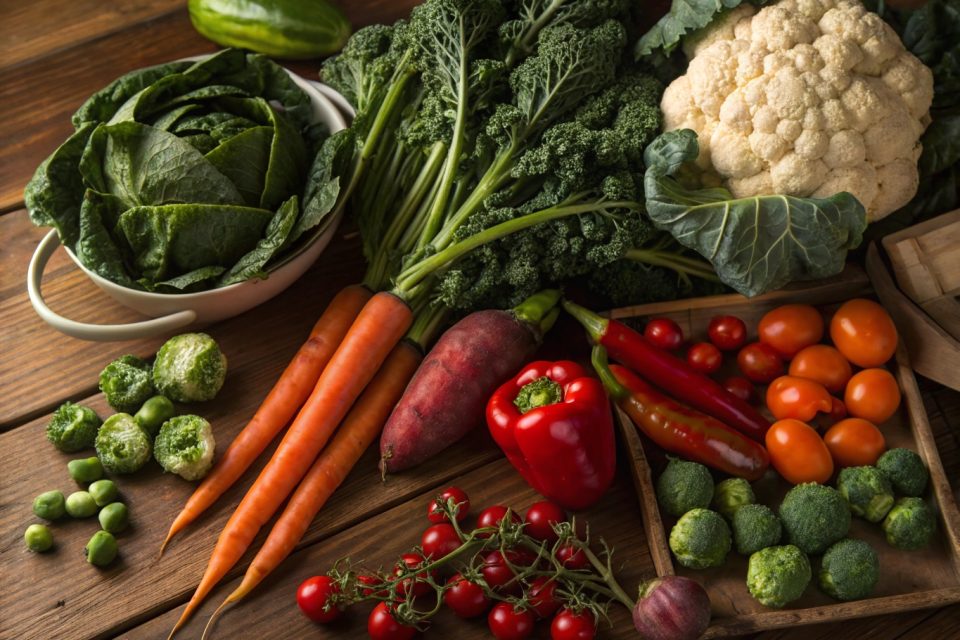Vegetables are nutritional powerhouses, loaded with vitamins, minerals, fiber, and phytochemicals that support optimal health. At To Eat Healthy, we’ve curated a list of the top 10 healthiest vegetables, backed by scientific studies, to help you boost your diet with nutrient-dense choices. Below, we outline their nutritional value and health benefits, supported by research.
1. Spinach
Nutritional Value (per 100g):
- Calories: 23 kcal
- Fiber: 2.2g
- Vitamin A: 469µg (52% DV)
- Vitamin K: 483µg (604% DV)
- Antioxidants: Lutein, zeaxanthin
Health Benefits:
Spinach is a nutrient-dense leafy green rich in vitamins A and K. A 2019 study in Nutrients found that lutein and zeaxanthin in spinach protect eye health by reducing the risk of age-related macular degeneration. Its high folate content supports cell function, and iron aids in oxygen transport, per a 2020 Journal of Nutrition study.
2. Kale
Nutritional Value (per 100g):
- Calories: 49 kcal
- Fiber: 3.6g
- Vitamin C: 120mg (200% DV)
- Vitamin K: 817µg (1021% DV)
- Antioxidants: Quercetin, kaempferol
Health Benefits:
Kale is a cruciferous vegetable packed with antioxidants. A 2021 study in Antioxidants showed that kale’s compounds reduce inflammation and may lower cancer risk. Its high vitamin C content boosts immunity, and vitamin K supports blood clotting and bone health, according to The American Journal of Clinical Nutrition (2018).
3. Broccoli
Nutritional Value (per 100g):
- Calories: 35 kcal
- Fiber: 2.6g
- Vitamin C: 89.2mg (149% DV)
- Vitamin K: 101.6µg (127% DV)
- Compounds: Sulforaphane
Health Benefits:
Broccoli’s sulforaphane has potent anti-cancer properties, as shown in a 2020 Molecular Nutrition & Food Research study. Its high fiber content promotes digestive health, and vitamins C and K support immunity and bone health, respectively. Regular consumption may also reduce heart disease risk, per a 2019 Nutrients study.
4. Sweet Potatoes
Nutritional Value (per 100g):
- Calories: 86 kcal
- Fiber: 3g
- Vitamin A: 709µg (79% DV)
- Vitamin C: 2.4mg (4% DV)
- Antioxidants: Beta-carotene
Health Benefits:
Sweet potatoes are rich in beta-carotene, which supports vision and immune function. A 2022 study in Food & Function linked beta-carotene to reduced oxidative stress. Their complex carbohydrates provide sustained energy, and fiber aids digestion and blood sugar control, per a 2020 Journal of Medicinal Food study.
5. Carrots
Nutritional Value (per 100g):
- Calories: 41 kcal
- Fiber: 2.8g
- Vitamin A: 835µg (93% DV)
- Vitamin K: 13.2µg (17% DV)
- Antioxidants: Beta-carotene, lutein
Health Benefits:
Carrots are a top source of beta-carotene, which converts to vitamin A for eye health. A 2018 American Journal of Clinical Nutrition study found that carrot consumption improved skin health and immune response. Their fiber content supports digestion, and low glycemic index helps manage blood sugar.
6. Brussels Sprouts
Nutritional Value (per 100g):
- Calories: 43 kcal
- Fiber: 3.8g
- Vitamin C: 85mg (142% DV)
- Vitamin K: 177µg (221% DV)
- Compounds: Glucosinolates
Health Benefits:
Brussels sprouts are cruciferous vegetables with glucosinolates, which may reduce cancer risk, per a 2021 Cancers study. Their high vitamin C content boosts immunity, and fiber supports gut health. A 2019 Nutrients study linked Brussels sprouts to improved heart health due to their anti-inflammatory properties.
7. Bell Peppers (Red)
Nutritional Value (per 100g):
- Calories: 31 kcal
- Fiber: 2.1g
- Vitamin C: 128mg (213% DV)
- Vitamin A: 157µg (17% DV)
- Antioxidants: Capsanthin
Health Benefits:
Red bell peppers are loaded with vitamin C and antioxidants like capsanthin. A 2020 Journal of Nutrition study found that their antioxidants protect against oxidative stress and inflammation. Their low calorie content and high water content make them ideal for weight management and hydration.
8. Beets
Nutritional Value (per 100g):
- Calories: 43 kcal
- Fiber: 2.8g
- Folate: 109µg (27% DV)
- Manganese: 0.3mg (16% DV)
- Compounds: Betalains
Health Benefits:
Beets contain betalains, which have anti-inflammatory and detoxifying effects, per a 2019 Food Chemistry study. Their nitrates improve blood flow and lower blood pressure, according to a 2021 Hypertension study. Folate supports DNA synthesis, making beets a great choice for pregnant women.
9. Cauliflower
Nutritional Value (per 100g):
- Calories: 25 kcal
- Fiber: 2g
- Vitamin C: 48.2mg (80% DV)
- Vitamin K: 15.5µg (19% DV)
- Compounds: Glucosinolates
Health Benefits:
Cauliflower is a versatile cruciferous vegetable with glucosinolates that may reduce cancer risk, per a 2020 Nutrients study. Its high vitamin C content supports immunity, and low carb content makes it ideal for keto diets. Fiber aids digestion, and choline supports brain health, per a 2018 Journal of Nutrition study.
10. Tomatoes
Nutritional Value (per 100g):
- Calories: 18 kcal
- Fiber: 1.2g
- Vitamin C: 13.7mg (23% DV)
- Vitamin K: 7.9µg (10% DV)
- Antioxidants: Lycopene
Health Benefits:
Tomatoes are rich in lycopene, an antioxidant linked to reduced prostate cancer risk in a 2019 Cancer Epidemiology study. Their vitamin C content boosts immunity, and potassium supports heart health. A 2020 European Journal of Nutrition study found that tomato consumption improved blood vessel function.

